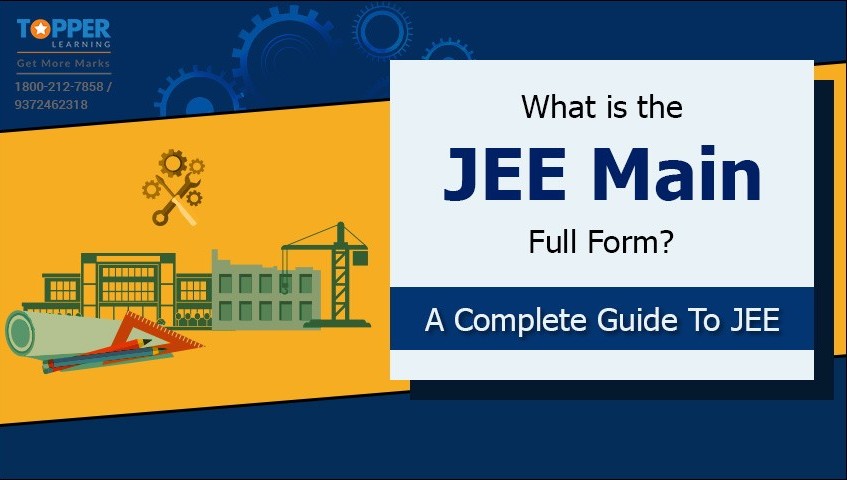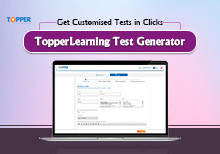JEE Full Form- A Complete guide to JEE

Every ambitious young engineer is willing to participate in the IIT JEE full form exam. Every aspirant desires to pass the exam. However, if you want to be one of them, start making the exam your dream, your commitment, and organise yourself with complete
By Topperlearning Expert 18th Apr, 2022 | 12:22 pm
ShareJEE Exam Full Form - What Is It All About?
The JEE full form in English is the Joint Entrance Examination. IIT JEE exam is an entrance exam for Architecture and Engineering Courses. The exam is held to gain admission to IITs, NITs, and other top engineering colleges throughout India. IIT JEE is a wonderful opportunity for young aspiring engineers. Now the question is, what is IIT JEE all about? The IIT JEE full form (examination) is the right platform for Engineering and Architecture aspirants. The exam allows students to showcase their abilities and expertise at the IIT level.
The JEE engineering examination consists of two different tests.
● JEE Main
● JEE Advanced
JEE Main full form - Details
The JEE Main examination is the first step in the IIT JEE process. NTA administers the exam online in January and April. The NTA employs LAN rather than the internet to initiate a secure and safe exam. The aspirants' journey will only start after passing the IIT JEE Main full form examination. The Mains scores determine eligibility for the next phase- JEE Advanced.
JEE Advanced full form - Details
JEE Advanced full form is the second step of the IIT JEE exam. The advanced exam is more complex than the JEE main exam. Students need to take this exam entirely online.
What is the Role of the JEE Exam?
The Joint Entrance Examination is the full form of the JEE entrance exam. Every year, lakh students pass the 10+2 exam and hope to gain admission to prestigious institutions. The organisations administering this exam select only the best students. Furthermore, students begin to prepare for the JEE exam, which automatically raises their standards. The main purpose of this examination is to select the cream layer of students from the rest.
Eligibility Criteria for IIT JEE
The Eligibility Criteria is an essential parameter before taking the examination. The National Testing Agency does have some instructions for the student's eligibility criteria. Before applying for either examination, the student must read these instructions.
|
Eligibility Criteria for the JEE Mains: |
Eligibility Criteria for the JEE Advanced: |
|
Nationality |
The result of the main exam |
|
Date of Birth and Maximum Age |
Criteria for College Admission based on Age and Date of Birth |
|
Class 12th or Equivalent Exam passing certificate |
Qualifying Exams' Titles |
|
Qualifying Exams' Titles |
Marks obtained in Qualifying Examinations |
|
Subjects covered in Qualifying Exams |
Number of Advanced Attempts |
|
Marks attained in Qualifying Exams |
|
JEE exam full form And Pattern
JEE exam full form is Joint Entrance Examination, and it holds two separate papers for Engineering. Here's a guide to help students distinguish between the two papers, Paper 1 and Paper 2, as per their Exam Pattern.
Main Exam Pattern
Paper 1
|
SUBJECTS |
NUMBER OF QUESTIONS |
TOTAL MARKS |
|
Physics |
30 |
120 |
|
Chemistry |
30 |
120 |
|
Mathematics |
30 |
120 |
|
TOTAL |
90 |
360 |
Paper 2
|
SUBJECTS |
NUMBER OF QUESTIONS |
TOTAL MARKS |
|
Mathematics |
30 |
120 |
|
Aptitude Test |
50 |
200 |
|
Drawing Test |
2 |
70 |
|
Total |
82 |
390 |
JEE Advanced Exam Pattern
Paper 1
|
SUBJECT |
SECTION(S) |
QUESTION(S) |
TOTAL MARKS |
MARKS (each correct answer) |
MARKS (each incorrect answer) |
|
Physics |
1 |
5 |
15 |
3 |
-1 |
|
Chemistry |
2 |
8 |
32 |
4 |
-2 |
|
Mathematics |
3 |
5 |
15 |
3 |
-1 |
Paper 2
|
SUBJECT |
SECTION(S) |
QUESTION(S) |
TOTAL MARKS |
MARKS (each correct answer) |
MARKS (each incorrect answer) |
|
Physics |
1 |
6 |
18 |
3 |
-1 |
|
Chemistry |
2 |
8 |
32 |
4 |
-2 |
|
Mathematics |
3 |
4 |
12 |
3 |
0 |
Tips to be followed while preparing for IIT JEE Main and Advanced
● Don't go through the Answers without first Solving the Questions
Rather than viewing solutions first in the solution booklet, students should attempt questions first. Many students read the questions and, if they find them difficult, they check for the answer. If they continue to do so, they will become reliant on the solutions. Students should also have a fighting spirit when answering difficult questions. Students should spend approximately 15 minutes on each question before referring to the solutions.
● Choose Chapters with High Weightage
Some chapters are crucial from the perspective of the examination. Students should be aware of the exam pattern and the chapter-wise weightage in JEE exams. Students should know which topics are more significant for exams and which are less relevant and should focus on the topics by analysing the degree of difficulty and weightage.
For Scoring Good Marks Students should have
● Coaching or reading material: There are numerous books available on the market, but choosing the best reference books for JEE exam preparation is a crucial task. Students should select a book that is appropriate for their level of understanding and comprehension.
● From Problem Solving to Logical Thinking: If students want to do well in the JEE entrance exam, they must think logically. Because the JEE Main exam lasts three hours, as a result, in exams, students should give each section equal time.
Therefore applicants with advanced logical thinking will score higher in examinations. It is not easy to attain competitive exam results, but it is also impossible! Give your best shot.
More from Education
Important Resources
- Education Franchisee opportunity
- NCERT Solution
- CBSE Class 9 Mathematics
- NCERT Solutions for class 10 Science
- Sample Papers
- CBSE Class 9 Science
- NCERT Solutions for class 10 Maths
- Revision Notes
- CBSE Class 10 Hindi
- CBSE Class 10 English
- CBSE Class 10 English
- CBSE Class 10 Social Studies
- CBSE Class 10 Science
- CBSE Class 10 Mathematics
- Career In Science After 10
- Career In Commerce After 10
- Career In Humanities/Arts After 10
- NCERT Solutions for Class 10
- NCERT Solutions for Class 11
- Business Studies Class 12 CBSE project





